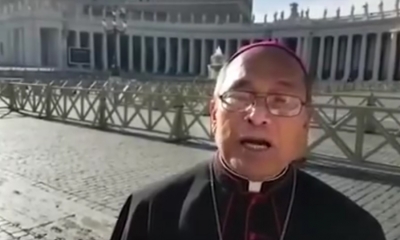Apuron Trial "Well Underway," but Expert Says It Could Still Take Years
By Pacific News Center
An expert in canon law says canonical trials are all "paper trials." Guam - The canonical trial of ousted Archbishop Anthony Apuron is "well underway," that's according to the archbishop who replaced him on Guam, Michael Byrnes. But we spoke with an expert with knowledge of canonical trials, Patrick J. Wall, and he says the process is not that simple, much less for a bishop. Apuron has gone underground since he was removed from his position has the shepherd of the local catholic faithful. For the most part, the community was told that a canonical trial was pending for Apuron. But over the last eight months little was known about a trial heís supposed to be facing in Rome for allegations of sexual abuse. No one knew where he was hiding. It wasn't until recently that he was discovered in California where his attorney, Jacque Terlaje, says heís staying to be able to "continue working on defending his innocence without distraction." Today, during a press conference held by Byrnes to discuss a new safe environment policy, he also answered questions about Apuronís canonical trial. "Itís just, itís ongoing. Actually the contact I just had the other day is that itís well underway, was the language used," said Byrnes. Wall, who was a former priest and acted as an investigator at one point for Rome. "Itís a paper trial; literally where the ordinary becomes aware of the problem so the local bishop or the pope becomes aware of the problem. They send an investigator, usually almost always is a priest," explains Wall. "The prosecutor, which the church calls a promoter of justice, then begins the formal canonical process of putting together all of the facts and then putting together charging papers against that particular priest or bishop." In fact, Wall says it could be years before the results of the trial are known. There are no benches and witness stands or defense tables for the parties to sit. There arenít any pews for spectators to watch from the sidelines. "This is all paper and itís all done in secret," Wall noted. Survivors are contacted as part of this canonical process but even they are held to a level of secrecy. "Usually theyíre all interviewed and deposed and itís a very formal procedure where the priest interviews them and they have to swear an oath of secrecy about the proceeding," Wall said. "And then that information is gathered. In the case of Apuron it would then be taken back to Rome where itís undiscoverable." No one will have access to it other than the congregation thatís handling the case. Wall says even at that, not the entire congregation, only the specific clergy members who are part of the trial, will have access. Wall notes that this process could take years and even the way it moves forward is chosen. "Thatís an important distinction," explained Wall, referring to either an administrative process or a judicial process. "Because if the holy father wants--remember this is a monarchy this is not a democracy--if the holy father wants this thing done, he could easily decide to move this things administratively, and a few people get some reasonable documents, get some reasonable amount of facts, however limited they may be, and then make a decision just to send them to a life of prayer and penance in a monastery."
|
.
Any original material on these pages is copyright © BishopAccountability.org 2004. Reproduce freely with attribution.
